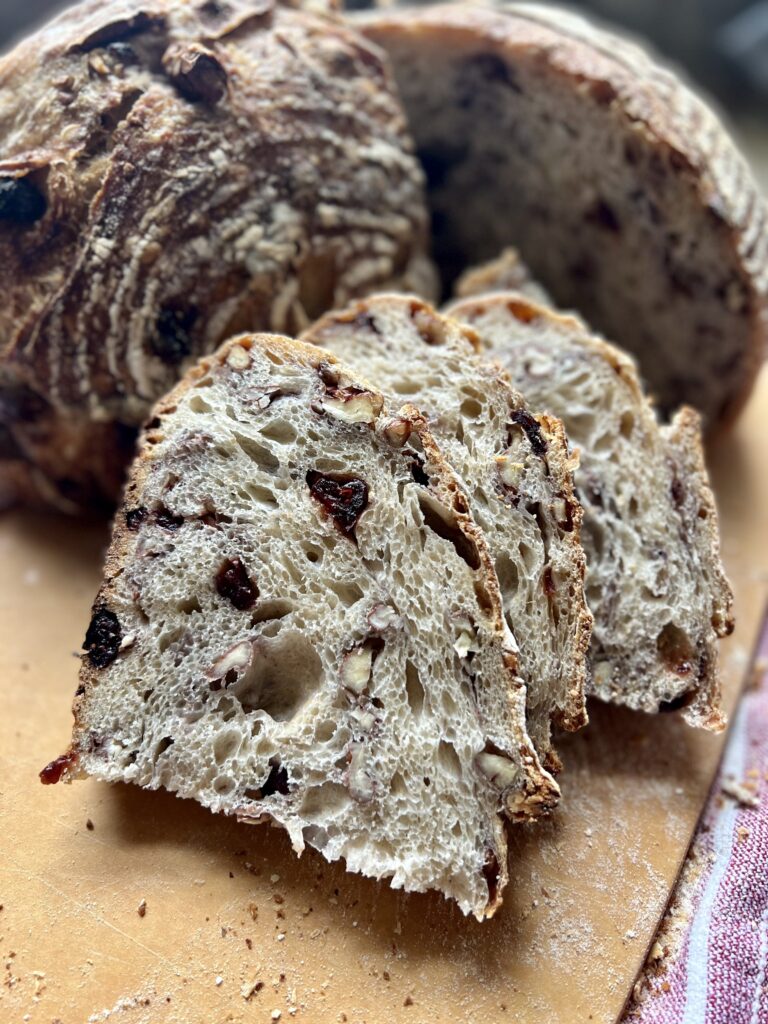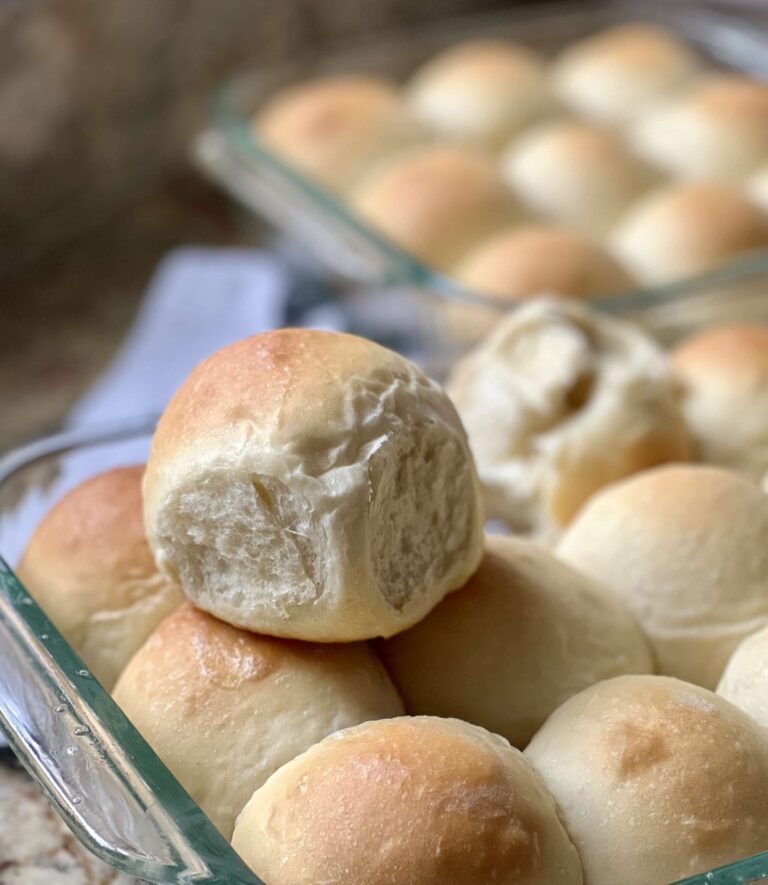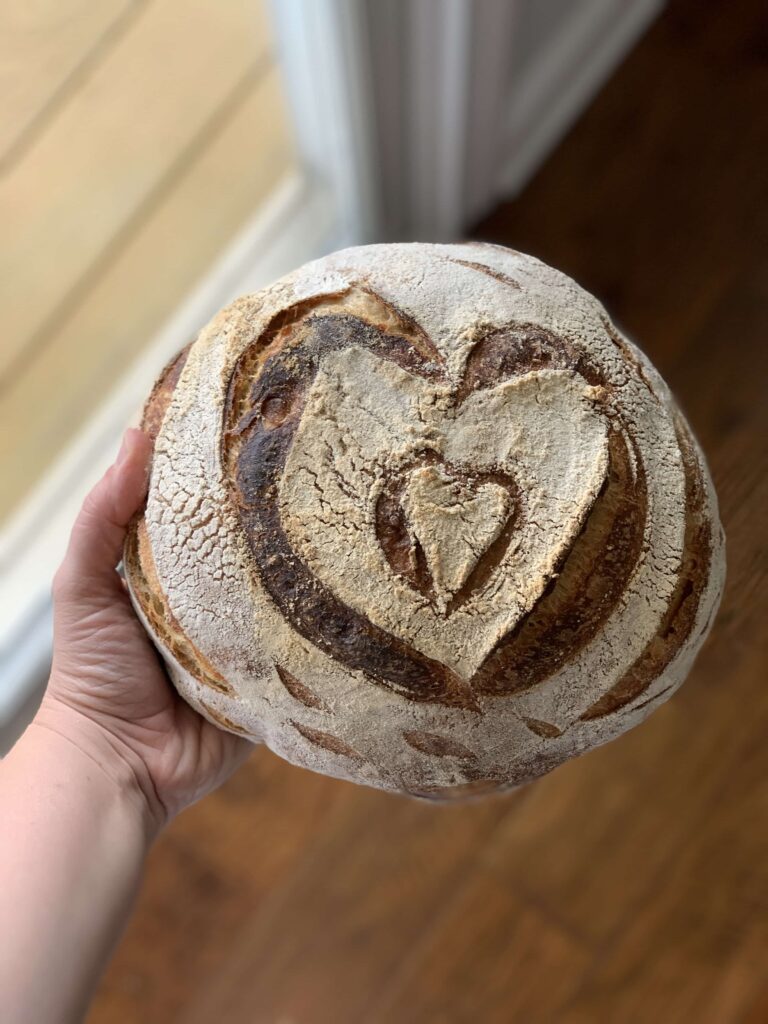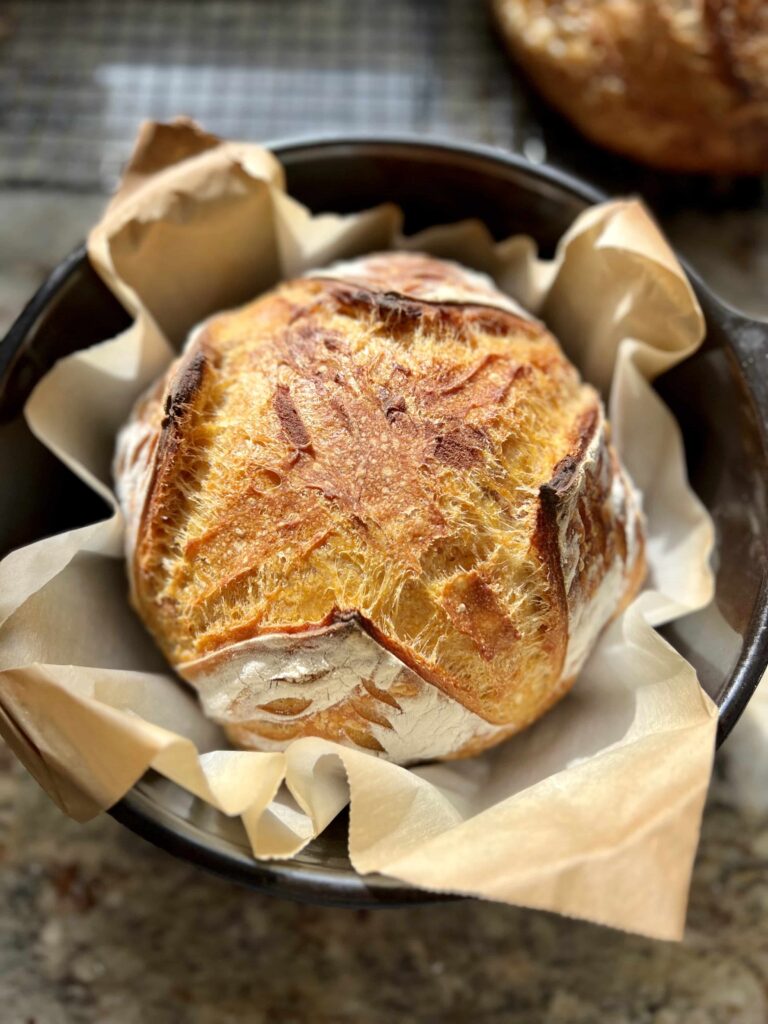Soft Rosemary Sourdough Bread
This post may contain affiliate links. Please read our disclosure policy.Soft Rosemary Sourdough Bread is the perfect small loaf for the dinner table. Soft, tender, and with just a little hint of sourdough, this bread is amazing when topped with some flaky sea salt and fresh rosemary. We even love eating this in place of rolls for Sunday dinner. It’s perfect for pulling apart or slicing. The dough in this bread is slightly enriched, making it soft and tender. Find all the details below and get this simple rosemary sourdough bread on your dinner table!

Important Ingredients in Soft Rosemary Sourdough Bread
- Sourdough Starter: Use an active/ripe sourdough starter (doubled in size/bubbly/mild sour aroma) to mix the levain.
- Salt: Salt enhances the flavor and helps the structure of the rolls. Don’t leave it out.
- Bread Flour: I almost always use a 12.5% protein bread flour for any bread that I am kneading. The higher protein content and properly activating the gluten results in a lighter/springy baked good.
- Olive Oil: Olive oil keeps this bread tender and moist. I use a mild flavored olive oil.
- Water: Use warmer water if your proofing environment is cold and cooler water if the proofing environment is warm. This will help keep your dough temperature around 78-80 degrees F.
- Rosemary: Fresh rosemary really comes through nicely on this loaf. If you have it, chop it and use it. If you don’t, you can substitute dried rosemary.
- Flaky Sea Salt: I love flaky sea salt. A little goes a long way, and it adds a delicious flavor to these loaves.



Sourdough Sample Schedule for Soft Sourdough Rosemary Bread
A sample baking schedule helps me when baking with sourdough. Sourdough takes much longer to rise than traditional bread. This schedule helps me plan my bake.
Note: This schedule assumes the dough temperature will be maintained at 78-80 degrees F throughout the process.
| 8:00 AM – 11:30 AM | Mix Levain (1:1:1) Cover and let sit for 3-4 hours until bubbly and ripe |
| 11:30 AM – 11:45 AM | Mix Dough |
| 11:45 AM – 3:45PM | Bulk Fermentation |
| 3:45 PM – 4:00 PM | End Bulk Fermentation (Optional: Cold Bulk Fermentation overnight) Divide and Shape Loaves |
| 4:00 PM – 6:30PM | Let bread rise in a warm (78-80+ degree F) place for 2-3 hours until puffed up and almost doubled in size. Do not bake unless dough has puffed up and risen. |
| 6:30 PM – 7:00 PM | Preheat oven at 425 degrees F. Top and bake loaves for 20 minutes until loaves are baked through. |

Mixing the Soft Dough
Set the bowl of a stand mixer on a kitchen scale. Add the ripe levain, water, sugar, olive oil and salt to the bowl. Add most of the flour, reserving a little bit to add in as you mix. This can help to account for excess liquid or humidity. Start the mixer and knead the dough together for about 8-12 minutes until smooth. Add the fresh or dried rosemary. Add a little extra flour as needed. This dough will be tacky, but not super sticky. For an extra check that the dough is ready, the dough should pass the windowpane test before moving on to bulk fermentation.

Bulk Fermentation
Move the dough to a container for the bulk fermentation. Do your best to keep the temperature of the dough at 78-80 degrees F. I use a bread proofer in the winter to help the dough develop at the right temperature. Cover the container. The entire bulk fermentation will take about 4 hours (depending on the temperature of the dough). By the end of bulk fermentation, you may notice the dough is more cohesive, strong and aerated. It will have risen a little, maybe as much as 20-30%.
Cold Fermentation Option: If it is more manageable for you to split this recipe up into multiple days, you can refrigerate the dough after the bulk fermentation. Place the covered dough in the refrigerator for up to 48 hours. Once you shape the loaves, allow a little extra time for the dough to rise as it comes up to the 78-80 degree F dough temperature.

Shape and Proof
Dump the dough on the countertop and cut in half. Use a bench scraper on/under one side of the dough and your hand on the other side to drag the dough into a circle, creating a round loaf and tension. Once you have a taut, round ball, place the dough on a parchment-lined baking sheet and repeat with the remaining ball of dough. Cover the loaves and let rise in a warm place (78-mid 80 degrees F) until light, airy and just about doubled in size.



Top and Bake
Preheat the oven to 425 degrees F. Once the loaves have proofed, take very soft butter and smooth over the top of the dough, being careful not to deflate the dough. If your butter is not soft, melt it a little until it is soft. Sprinkle flaky sea salt and rosemary over the top of the loaf. Bake for about 20-25 minutes until the loaves are browned and baked all the way through (200 degrees F). Let loaves cool completely before slicing and enjoying!





If you like this sourdough rosemary bread, you’ll also like:
Frequently Asked Questions
This recipe makes two smaller loaves, perfect for dinner. I like to freeze one of the cooled loaves and then thaw and warm it up later. I have also sliced the bread and frozen the slices.
This soft rosemary bread is baked as an open bake on a baking sheet in the oven. It has a softer crust and more closed crumb than traditional sourdough bread. With that said, if you want to bake it in a dutch oven, you can.
Fresh rosemary gives a beautiful flavor to this bread. If you don’t have fresh, you can use dried.
It probably didn’t rise enough. Make sure that the dough temperature is in the 78-80ºF range during bulk fermentation and the rise. You may need to stick the dough in an oven with the light on (not the oven turned on) to warm the dough up. The proofed dough should be light, airy, jiggly and just about doubled in size before you bake it. This will keep the dough from being dense.







Soft Sourdough Rosemary Bread
Ingredients
Levain (1:1:1) ready in 3-4 hours at 78 degrees F
- 45 grams ripe/active sourdough starter
- 45 grams water
- 45 grams all purpose or bread flour
Soft Sourdough Rosemary Bread
- 120 grams ripe/active levain
- 350 grams water
- 14 grams sugar
- 15 grams olive oil
- 12 grams salt
- 3-4 grams fresh or dried rosemary chopped, see recipe notes, about 1 Tablespoon
- 600 grams bread flour about 4-5 cups
Topping
- 30 grams softened butter about 2 Tablespoons
- sprinkle of flaky sea salt see recipe notes
- sprinkle of fresh/dried rosemary reserved for topping
Instructions
Levain (1:1:1, 3-4 hours until bubbly and active)
- Mix together 45 grams of ripe and active sourdough starter with 45 grams flour and 45 grams water. Cover and let rise for 3-4 hours until levain has doubled in size, peaked and is airy and filled with bubbles.
Soft Sourdough Rosemary Bread
- To the bowl of a stand mixer add ripe/active levain, water, sugar, olive oil, salt, rosemary and bread flour. Mix until completely combined and the dough feels tacky (not super sticky) and pulls away from the sides of the bowl. I like to reserve about 1/2 cup of bread flour and add it in as the dough kneads together, making sure that I'm not adding too much flour to the dough.
- Knead together for 8-10 minutes, adding the rest of the flour as needed, until the dough is soft and smooth. The dough should be tacky to the touch, not overly sticky. If it is very sticky, add a little bit more flour, about 20-30 grams at a time.
- Bulk Fermentation: Put the dough in a container and cover. Set the dough in a warm, 76-78 degree F place for 4-5 hours. Take the temperature of the dough as needed to maintain the dough temperature right around 78 degrees F (I use this bread proofer to keep my dough temperature consistent). At the end of about 4 hours, the dough should be puffed up and feel very elastic. If it doesn't feel this way, let it bulk ferment for another half hour and check again
- Overnight Option: At this point, after the bulk fermentation has finished, you can cover the dough and put it in the refrigerator for 24-48 hours. Proceed with the recipe the next day, shaping and proofing the rolls before baking. Give the dough a little extra time to rise to compensate for the cold ferment.
- Shaping: Dump the dough onto a countertop. Cut the dough in half. Put one hand to the side of the dough and the other hand use your bench scraper to turn/drag the dough to form a ball in a circular motion creating tension for the loaf. Place the ball of dough on a parchment-lined baking sheet. Repeat with the second loaf.
- Proofing: Cover the loaves with a dish towel and let rise in a 78 to mid 80 degree F place until puffed up, almost doubled in size and risen, about 2-3 hours. Do not bake these loaves if they have not risen.
- Topping: Top the loaves with very soft butter, a sprinkle of rosemary and a sprinkle of flaky salt.
- Baking: Pre-heat the oven to 425 degrees F. Bake for about 20-25 minutes until the loaves are dark and baked all the way through. Let cool completely and enjoy!







Whenever I bake with Rosemary, I have memories of Sequoia brushing up against our rosemary bushes and adding a lovely aroma everywhere she went! 🤣😂🌿…and your dad’s amazing salmon with fresh rosemary! 🐟
Beautiful loads of rosemary bread! Thanks for sharing! 👩🏼🍳🍞😋
Can’t wait till make this! ❤️❤️ Rosemary is my favorite!
It’s such a good flavor combination!
This bread! I used fresh rosemary and Amy’s recommended flaky sea salt. I also have the bread proofer mentioned and the dough rose beautifully. The scent of the rosemary while baking was ambrosial. Everyone I’ve shared this bread with has absolutely LOVED it! Thank you for sharing.
I’m so glad you loved it! Thanks for sharing.
Hi Amy – quick question as I’m still a little bit of a newbie to the bread world. I followed your instructions and kept my dough around 78/79* during the BF process and after 4 hours, we had risen & the dough was elastic on top but when I dropped out to the counter, it was so sticky and I was barely able to work the dough. I sprinkled some flour and did my best and when added to the cookie sheet, they’re spreading out vs up. Is this a case of being over-fermented?
Thank you in advance!
Were you using bread flour? These loaves tend to spread out rather than up because they have nothing to keep them in shape, other than their own gluten strands. Usually this dough isn’t super wet but it is still a little sticky. I doubt it was over fermented in 4 hours, more likely reduce the water a little bit next time.